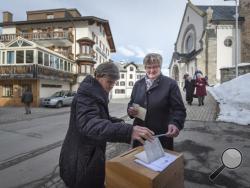BASEL, Switzerland (AP) — Voters in Switzerland decided Sunday to make it easier for young "third-generation foreigners" to get Swiss citizenship, agreeing to extend to about 25,000 people under age 25 access to the fast-track process now available to foreign spouses of Swiss nationals.
The national statistics office said the "naturalization of third-generation immigrants" initiative passed with 60.4 percent of the vote, paving the way to a simplified path to citizenship for young people whose parents and grandparents have lived in Switzerland for decades.
As in some other European countries, being born in Switzerland doesn't automatically confer citizenship. While about 25,000 people are estimated to be eligible for the new process, the referendum's passage ultimately could be far-reaching in a country where non-citizens make up one-fourth of the population.
The citizenship measure was one of three on the national ballot on Sunday. Another carried international implications: Voters handily rejected a corporate tax reform designed to harmonize taxes at a competitive, relatively low rate, a victory of sorts for the political left that had shunned alleged handouts to foreign businesses.
The statistics office said 59.1 percent of voters rejected the measure, which would have scrapped the two-track tax system that offers lower rates to foreign firms to lure investment — potentially at the expense of higher tax-countries of the neighboring European Union.
Experts say the tax initiative's failure means that overall rates are likely to be set higher — which would be a disincentive to companies that bring in jobs and ultimately tax revenues.
Many domestic companies, meanwhile, could see their tax rates go down.
Critics including regional government leaders and much of the political left had said the initiative would deplete tax coffers for an uncertain payoff.
Proponents had countered that the reforms were needed to keep competitive a country that has few exportable natural resources and relies heavily on globalized industries such as finance and pharmaceuticals.
U.S.-based machinery giant Caterpillar, which employs 600 people in Switzerland and has its Europe, Africa and Middle East headquarters in Geneva, had vocally expressed support for the tax reform referendum, and expressed "respect" for the public's will after it was rejected.
"Though this vote creates additional uncertainty in a challenging business environment, we remain confident that Switzerland and the Cantons (regions) will find a consensus allowing to pass a new federal tax law that will support innovation and employment for all economic actors in Switzerland," the company said in a statement Sunday.
Despite the rejection, Switzerland must still abolish its two-track system: Sunday's measure would have kept future rates relatively low, and now policymakers will have to come up with a new plan — which could raise rates on foreign firms.
The "third-generation foreigners" initiative will mean less paperwork, fewer delays and lower fees for anyone under 25 whose parents and grandparents have lived in Switzerland for years, but who did not go through the time-consuming, onerous naturalization process.
Its immediate beneficiaries are mostly people from elsewhere in Europe or Turkey whose families have been in the Alpine nation for decades, not migrants and refugees from Africa and the Middle East whose recent arrival in Europe has sparked a backlash from the political far-right.
Switzerland, which is not in the 28-nation European Union but is all but surrounded by bloc members, has been taking in foreigners for centuries.
To become a citizen generally requires 12 years of residency, mastery of at least one of Switzerland's four national languages, and honoring the "fundamental values" of the Swiss Constitution, such as equal rights for women and men and freedom of conscience.
Sunday's referendum was the latest installment of Switzerland's direct democracy that gives voters a frequent say on political decisions. A third issue on the national ballot involving infrastructure spending passed with 61.9 percent of the votes.
Voters in the eastern Graubuenden canton, or region, also decided against a bid to host the 2026 Winter Olympics. Four years ago, the region rejected a similar referendum about the 2022 Winter Games, which were eventually awarded to Beijing.

